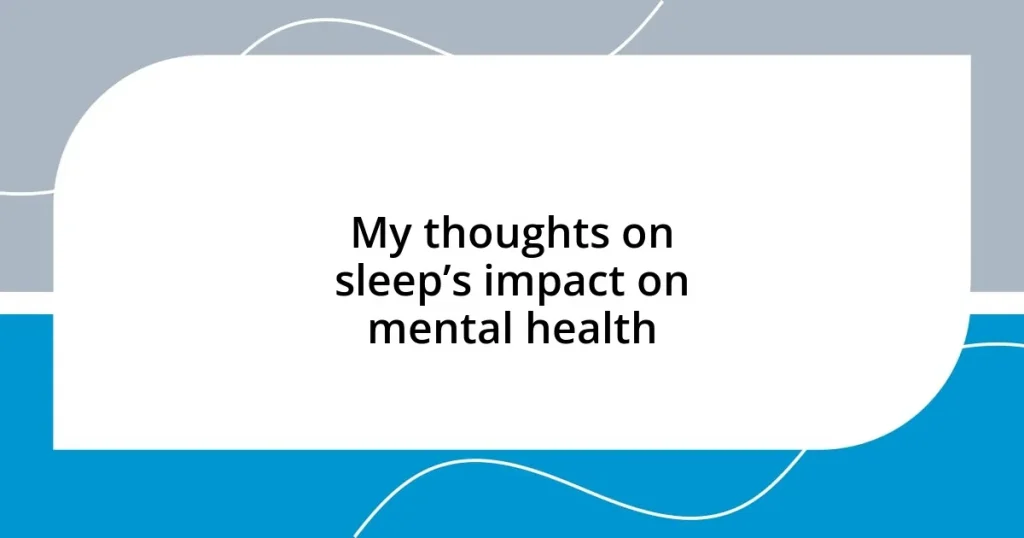Key takeaways:
- Quality sleep significantly improves mood, cognitive function, and stress management, highlighting its vital role in mental health.
- Lack of sleep can lead to emotional instability, cognitive decline, and increased stress, forming a detrimental cycle.
- Implementing strategies like a bedtime routine, limiting screen time, and creating a comfortable sleep environment can enhance sleep quality.
- Seeking professional help, such as therapy for insomnia, can provide personalized strategies and decrease feelings of isolation related to sleep issues.
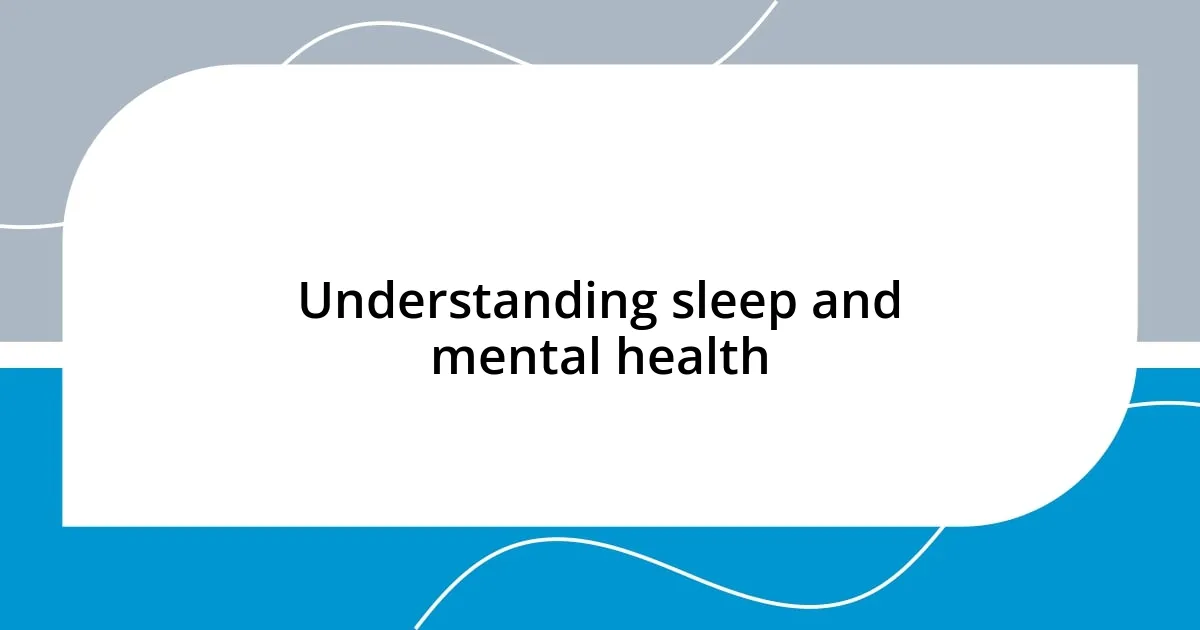
Understanding sleep and mental health
Sleep is such a fundamental part of our lives, and I’ve often found myself questioning how deeply it connects to our mental well-being. When I don’t get enough quality sleep, I notice a stark difference in my mood and ability to cope with daily stressors. It’s almost as if my brain fog is a direct reflection of my sleepless nights, which really makes me wonder—how can we prioritize sleep in our hectic lives?
Think about those nights when sleep eludes you. I’ve been there, tossing and turning, and the next day feels like wading through molasses. Those lack of Z’s can spiral into anxiety or even depression, fueling a cycle that can feel impossible to break. It’s astonishing how much a simple night of restorative sleep can shift not just our mood but our overall outlook on life.
Research shows that sleep plays a critical role in emotional regulation; this resonates with me personally. I’ve learned that a decent night’s sleep can help me tackle challenges with clarity and resilience. It begs the question: Are we recognizing the importance of sleep in our mental health journeys? A few deliberate changes in my evening routine have made a world of difference, and I can’t help but wonder how many others might benefit from some simple strategies for better sleep.
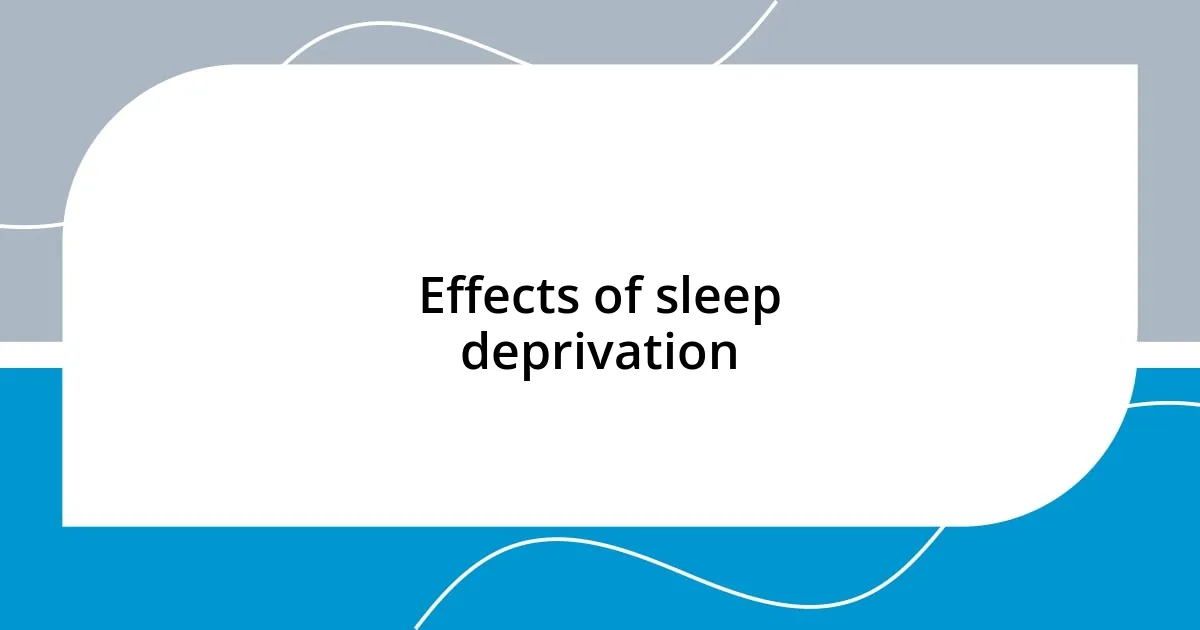
Effects of sleep deprivation
Sleep deprivation can have a profound impact on our mental health, often leading to mood swings and increased irritability. I can recall a week where I barely managed four hours of sleep each night. It felt like I was walking through a haze, unable to focus, and even my smallest tasks became monumental challenges. The emotional toll was palpable; I found myself snapping at loved ones over trivial matters, a clear indication of how my lack of sleep affected my emotional stability.
When sleep is compromised, our ability to manage stress diminishes. For a while, I struggled with anxiety, especially during busy workweeks. Each sleepless night piled on more stress, creating a cycle that felt hard to escape. It’s interesting to realize how intertwined sleep is with our stress responses. The impact isn’t just mental; it seeped into every aspect of my life, causing physical symptoms like headaches and fatigue that made my anxiety even worse.
What surprised me most is that sleep deprivation can even manifest as cognitive decline. I remember a period when my memory seemed to falter during important meetings. It was both embarrassing and frightening. I’ve learned that the brain requires adequate sleep to process and retain information. All the late-night study sessions I’d pulled in college suddenly felt like a misguided approach. It’s clear now that I should have prioritized those hours of sleep for the sake of my cognitive function.
| Effects | Description |
|---|---|
| Mood Changes | Can lead to irritability and emotional instability. |
| Stress Management | Reduces the ability to cope with stress effectively. |
| Cognitive Decline | Affects memory, focus, and overall mental sharpness. |
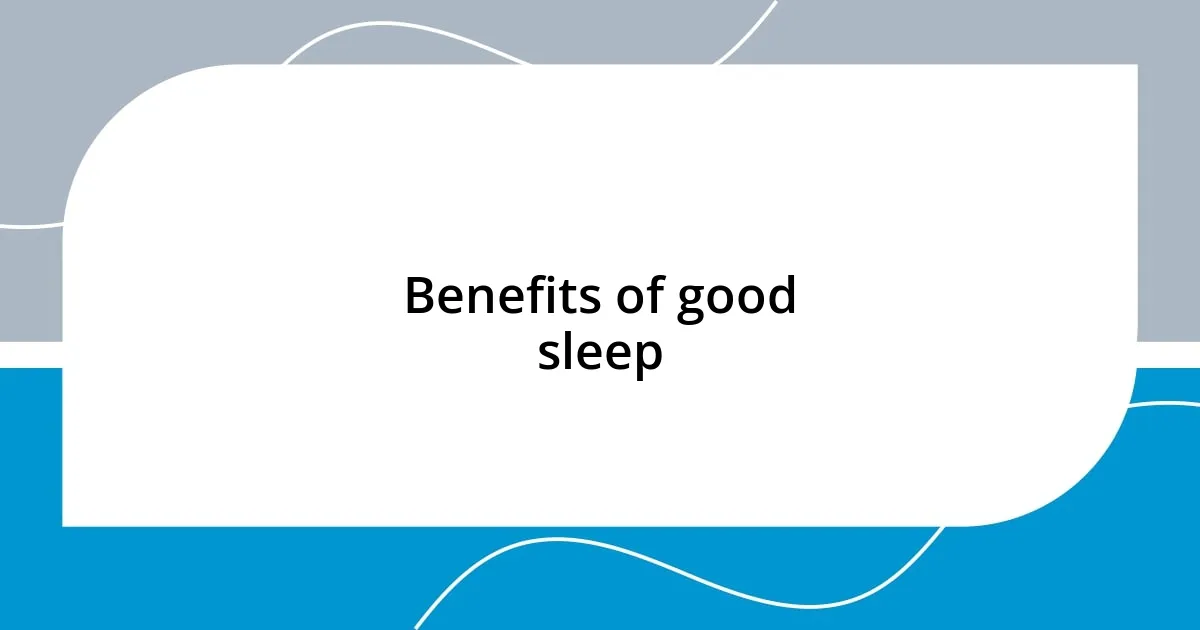
Benefits of good sleep
Good sleep brings about an undeniable sense of clarity that I’ve come to truly appreciate. When I wake up refreshed, it’s like someone has turned the lights on in my brain. My productivity skyrockets, and I find myself approaching tasks with a much more positive mindset. In fact, I’ve noticed that my creativity flourishes the better rested I am. It’s fascinating how much of an influence those restorative hours have on my daily life.
- Improved Mood: A solid night’s sleep often leads to increased feelings of happiness and reduced irritability.
- Enhanced Cognitive Function: Quality sleep sharpens focus and boosts memory retention, facilitating better decision-making.
- Better Stress Management: With adequate rest, I find it easier to approach stressful situations with a calm and collected attitude.
- Stronger Emotional Resilience: Good sleep helps me regulate emotions more effectively, allowing for healthier responses to challenges.
What’s more, I’ve come to realize that quality sleep plays a significant role in physical health as well. On days when I get the sleep I need, I feel more energized and ready to tackle any workout, which in turn contributes positively to my mental health. I once ran a 5K after a great night of sleep, and I could feel the difference in my energy levels and spirit. There’s a real connection between feeling physically good and maintaining mental well-being, underscoring the importance of giving our bodies the recovery they need.
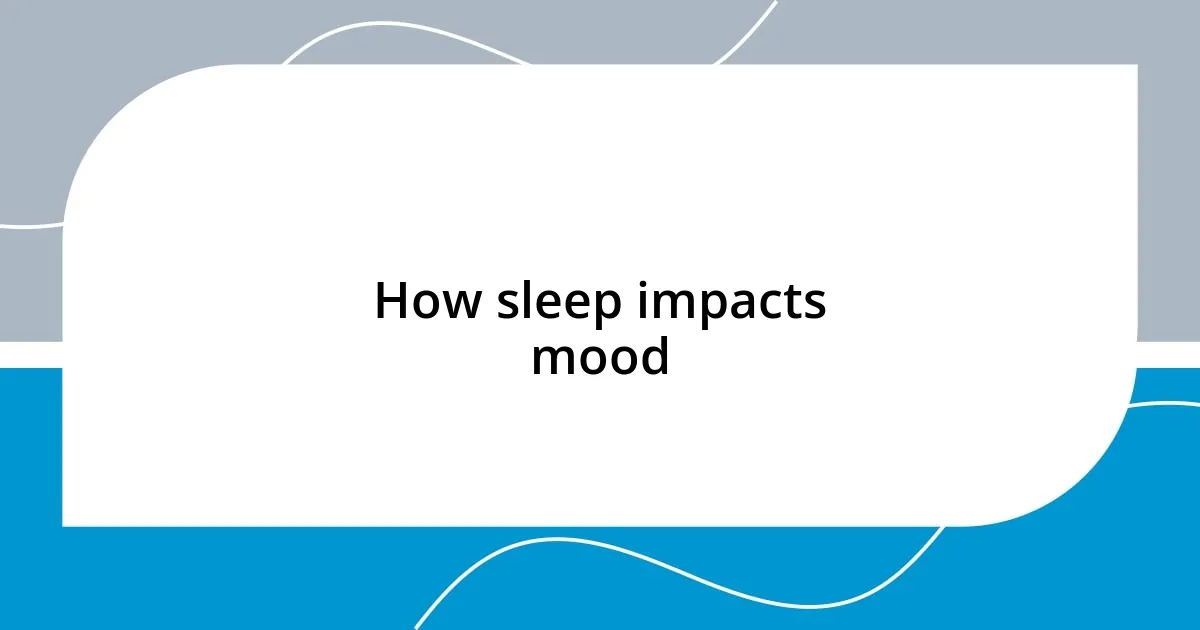
How sleep impacts mood
When I skimp on sleep, I often find myself feeling uncharacteristically short-tempered. I remember a time when I had just a few hours of sleep before an important family gathering. Rather than enjoying the moment, I was irritable and on edge, easily frustrated by the lightest of comments. It really made me think about how deeply our mood is tied to our rest; it’s like a delicate balance that can tip with just one night of poor sleep.
Interestingly, I’ve noticed that a lack of sleep not only affects my feelings but also alters how I view challenges. There are days when, after tossing and turning the night before, obstacles seem insurmountable. It’s almost as if my resilience has been drained overnight, leaving me vulnerable to negative emotions. I often question: why do we underestimate the power of a good night’s sleep when its effects are so profound?
On the flip side, a well-rested night can feel like a warm embrace. I vividly recall waking up refreshed after a weekend of sleep catch-up. The world seemed brighter, and I could tackle the day’s tasks with a sense of enthusiasm. That feeling reinforces the idea that quality sleep not only boosts our mood but also empowers us to handle life’s ups and downs with grace. It’s a remarkable transformation that I strive to embrace—sleep as a true ally in maintaining my emotional well-being.
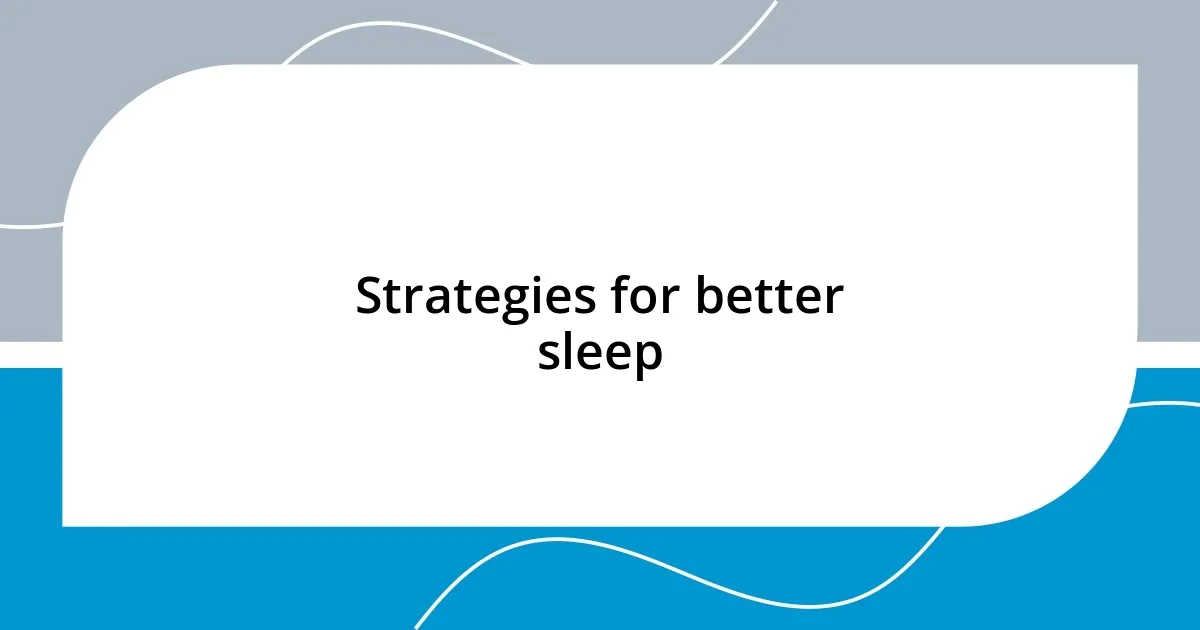
Strategies for better sleep
When I think about strategies for better sleep, one practice stands out: creating a bedtime routine. I found that dedicating 30 minutes to unwind before bed—whether it’s sipping herbal tea or reading a book—transforms my sleep quality. It’s almost like telling my body, “Hey, it’s time to relax,” and this small shift has made a world of difference. Have you ever noticed how your mind races just when you need it to calm down?
Another approach that has worked wonders for me is limiting screen time in the evening. It’s astounding how the blue light from screens can trick our brains into staying alert. I vividly recall nights when I’d scroll through social media right before bed, only to toss and turn hours later. Now, I set a “digital curfew,” and surprisingly, I drift off with much greater ease. It makes me wonder—could this simple change be the key to conquering sleepless nights?
Lastly, I can’t stress enough the importance of creating a comfortable sleep environment. I invested in blackout curtains and a white noise machine after countless restless nights, and the improvement was immediate. There’s something about a dark, quiet room that signals to my body it’s time to rest. Have you experimented with your sleep environment? You might be surprised at how small adjustments can lead to deeper, more restorative sleep.
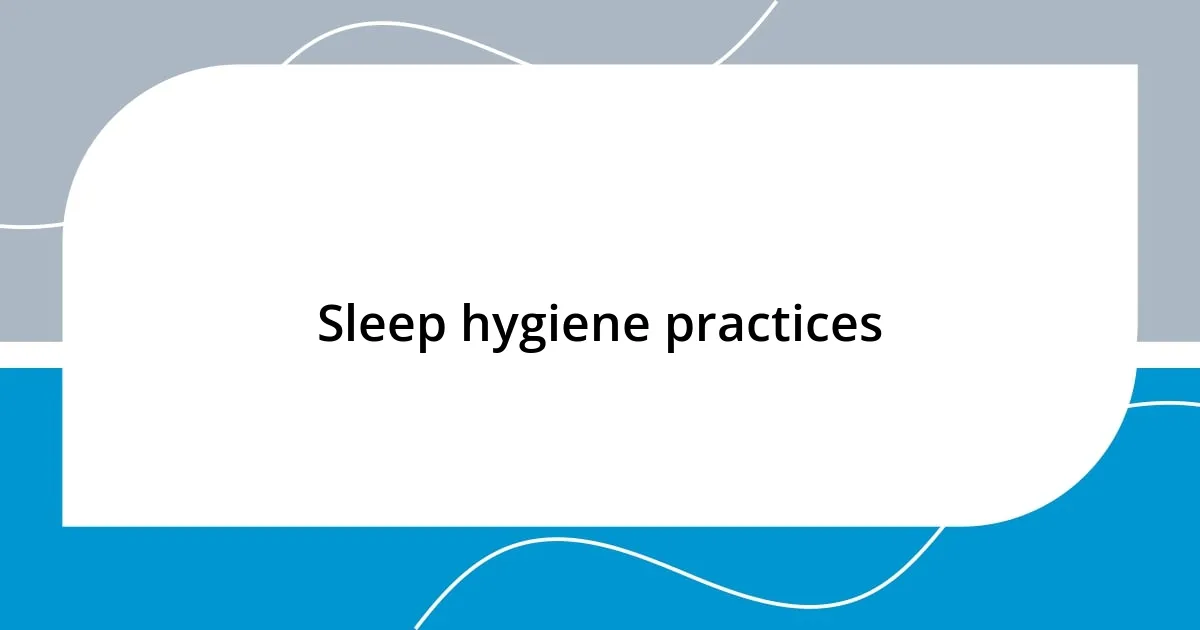
Sleep hygiene practices
One of my go-to sleep hygiene practices is maintaining a consistent sleep schedule. I’ve noticed that going to bed and waking up at the same time—even on weekends—helps regulate my body’s internal clock. There’s something almost comforting about this routine; it feels like my body knows exactly when it’s time to relax and when it’s time to rise. Have you ever felt that rhythm in your own daily life?
Another practice I can’t overlook is how I manage my caffeine intake. I made a conscious choice to cut off coffee and other caffeinated beverages by mid-afternoon, and I can tell you, the impact was substantial. That afternoon slump used to drive me to reach for another cup, but now, I opt for herbal tea—like chamomile—which not only satisfies but also signals my body that evening relaxation is on the horizon. When was the last time you consciously monitored what you consume before bedtime?
Lastly, mindfulness and relaxation techniques have become vital for my sleep hygiene. Incorporating simple practices like deep breathing or gentle stretching before bed has allowed me to release the day’s tension. I recall a night when I was particularly stressed and decided to try a few minutes of meditation. Surprisingly, that intentional pause made me feel as if I was shedding weights off my shoulders, paving the way for a much-needed restful night. Have you ever explored the power of calming your mind before sleep? I promise, it’s worth considering.
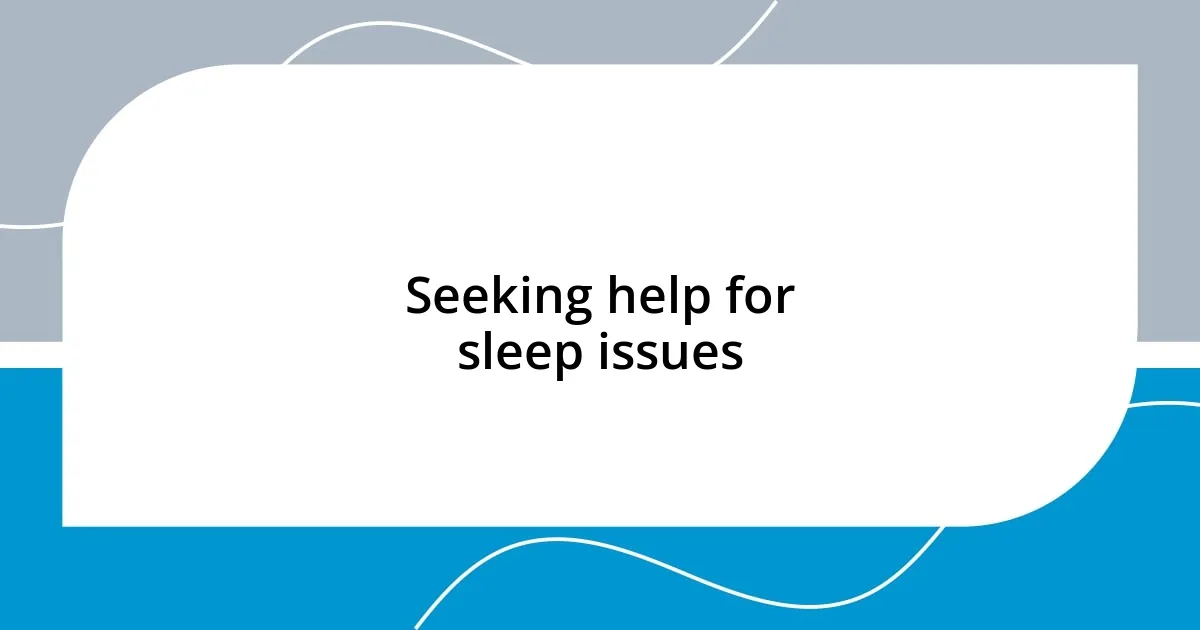
Seeking help for sleep issues
When I’ve found myself struggling with sleep, reaching out for help has been a crucial step. I remember a particularly challenging period when my restless nights turned into foggy days. Finally, I consulted a sleep specialist, and this decision changed everything. Have you ever thought about how liberating it can feel to share your sleep concerns with someone who understands?
Talking to a professional not only provided me with tailored strategies but also reassured me that I wasn’t alone in my sleep struggles. It was eye-opening to learn about cognitive-behavioral therapy for insomnia (CBT-I), which focuses on changing the thoughts and behaviors that contribute to sleeplessness. Has the idea of seeking professional guidance ever crossed your mind? It’s a proactive step I wish I had taken sooner.
Support groups can be another valuable resource. Connecting with others facing similar issues has helped me feel less isolated. In fact, hearing someone share their experience with sleep anxiety made me realize how profoundly our mental and emotional states intertwine with our sleep. Have you considered how a listening ear could help? Finding community support might just be the missing puzzle piece to reclaiming restful nights.











